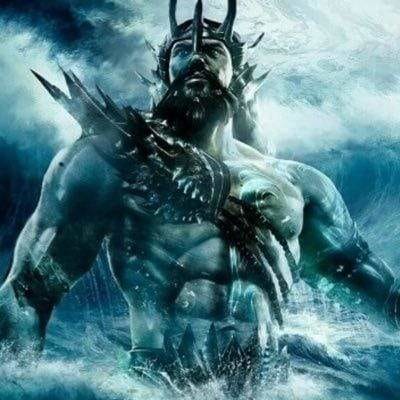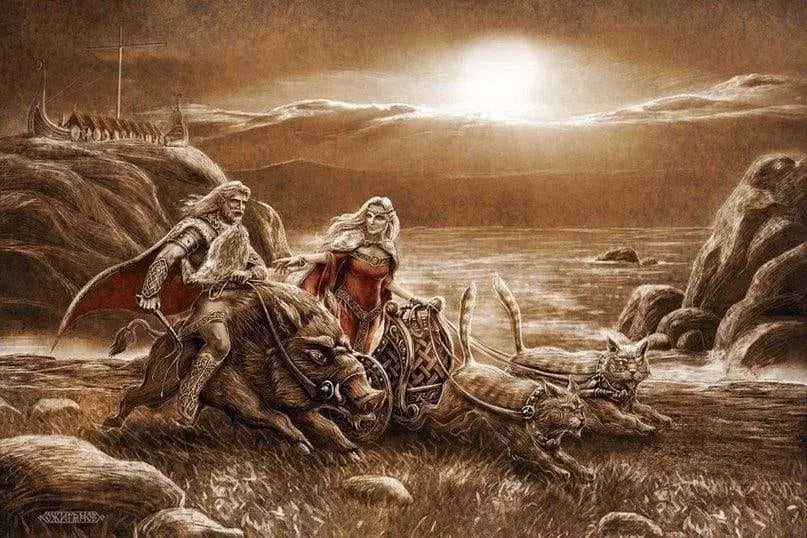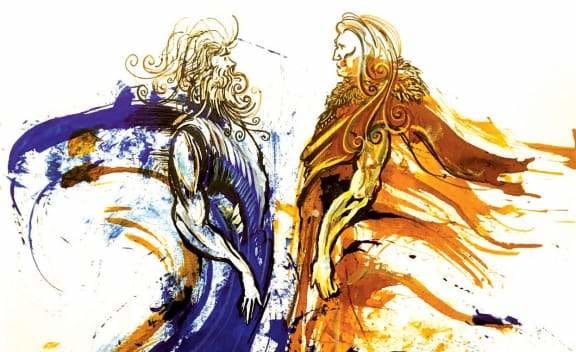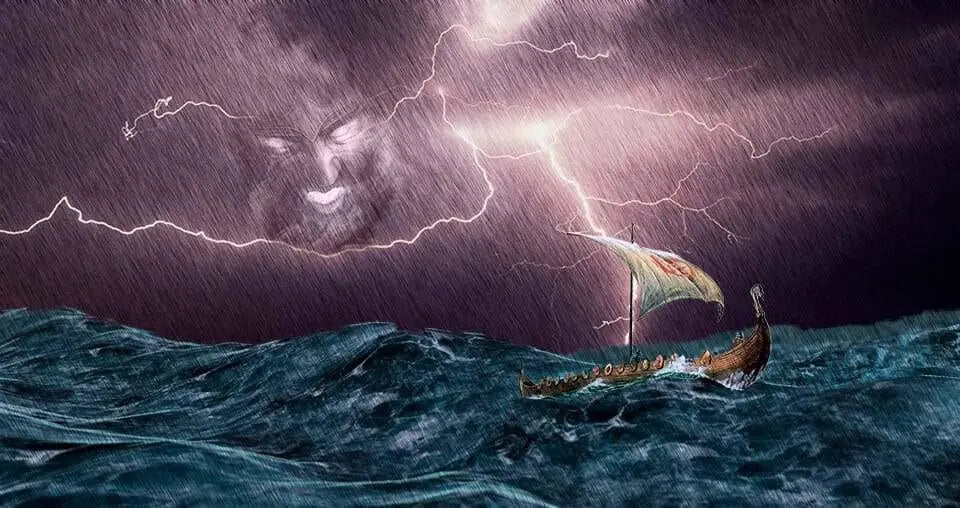Njord God. Check out Njords Abalone Shell Ring. We Vikings and as seafaring people, we would expect that the gods of the sea and the wind would be epic Indeed, Thor himself was, among other things, a god of storms and weather.
But the primary god of the sea and winds in Norse mythology was the lesser known deity Njord. A complex and multifaceted god like all the Norse deities, as well as being a god of seafaring, Njord was also a god of wealth.
Perhaps it is not surprising that the Vikings associated wealth with the sea, since much of their wealth was gained from sea raids.
Who was Njord, the Norse God of the Sea?
Njord, njörðr (pronounced nyord) is not in fact an Aesir god, but one of the Vanir gods. The Vanir are a second race of gods that warred with the Aesir in the distant past.

The war was largely caused by the Aesir’s disapproval of elements of Vanir culture, such as the practice of incest.
When the war between the two races ended, Njord God was one of the three Vanir gods, alongside Freyr and Freya, sent to live among the Aesir as hostages. All three quickly became trusted members of the Asgard community.

Odin even made Njord and Freya the priests of sacrifices in Asgard.
Njord was the god of wind, seafarers, coasts and inland waters. He was also associated with crop fertility, fishing and wealth.
He was invoked by the Vikings before setting out on sea voyages, but also hunting and fishing expeditions.
He was believed to have the ability to calm waters and quell fires. Njord is described as being extremely wealthy and prosperous, and able to grant wealth in the form of land and valuables to those who invoke his aid.
Family
Njord was the twin brother of Nerthus, who was also his wife before he was sent to Asgard. With Nerthus he had two children, the twins Freyr and Freya.

These twins were also married, but when they were sent to Asgard along with their father, Odin annulled their marriage as unnatural.
Njord’s marriage to his twin sister was also annulled, and he went on to marry the giantess Skadi. See our range of Viking Rings.
Njord God and Skadi
Skadi was the daughter of the giant Thjazi, who famously kidnapped Idun from Asgard.
Idun was the goddess responsible for caring for the fruits eaten by the gods that enabled them to retain their youth and vigour.

Loki, who also assisted Thjazi in kidnaping Idun, also eventually rescued her, with Thjazi giving chase. When Thjazi did not return, Skadi assumed that he must be dead and swore vengeance.
To seek her revenge Skadi travelled to Asgard, where the gods offered her gold to compensate her for her father’s death.
Skadi said that she would only settle for the husband of her choice from among the gods.
The gods agreed, on the condition that she chose her husband only by looking at his feet.
She chose the feet that she considered to be most beautiful, assuming them to belong to Balder, son of Odin and the most beautiful of the Norse gods.
But the feet were in fact those of Njord. Skadi was horrified by the realisation as Njord’s face was worn by the sea and he smelled of salt.
Their union did not last long as they could not agree on where to live. Njord considered Skadi’s home in the land of the giants too cold and desolate.
Skadi did not like the noise and activity of Njord’s home, a house on the seashore of Asgard called Noatun, which means ship haven.
Each could only tolerate the home of the other for nine nights, and so went their separate ways.
Later Skadi had a relationship with Odin, with whom she had many children.
Njord God and Ragnarok
Njord is one of the few Norse gods that is said to survive Ragnarok, the Norse apocalypse, according to the Poetic Edda. It suggests that he will return to the Vanir during the final battle where he will survive.
Importance of Njord
While Njord is not often mentioned in the surviving literary sources for Norse mythology, it is clear that he was one of the most venerated of the Norse gods.
According to the Poetic Edda Njord was rich in temples in Viking times. This is probably why his name is preserved in so many Scandinavian place names in Sweden, Norway and Iceland. These may have originally been the locations of his temples.

Later, Njord was one of three deities involved in the 14th century Icelandic legal oath, sworn on a temple ring, along with Freyr and Ass (probably a name for Odin or Thor).
He was still venerated in the 18th and 19th centuries as part of Norwegian folk practices in which Njord was thanked for a bountiful catch of fish.
The prevalence of the cult of Njord in Scandinavia is also attested by accounts of its denunciation by an eleventh century Christian convert who describes himself as forsaking the folly of Njord in favour of Christ.
God of Sea and Wind
In his role as a sea god, Njord appears to be a helper and supporter of men.
This is in stark contrast to Aegir, a Norse giant also associated with the sea. He was considered a more dangerous being, and if the Vikings saw great waves approaching their ships, they would fear that Aegir was nearby, and perhaps invoke Njord to counter Aegir’s more destructive force.
Unlike Njord, who was a giver of wealth, Aegir was a taker. He was thought to cruelly smash ships in order to take their gold and treasure for himself.
Like Njord, Aegir was married to his sister Ran, with whom he had nine daughters, which were the spirits of the waves. Ran was also seen as a hostile force in the sea, dragging people down into the ocean with her huge fishing nets.
Thus, it seems that while Aegir and Ran represented the dangerous and destructive side of the sea, it was Njord who embodied the power of the sea to give and provide.
Njord: The Norse Deity of the Sea, Wind, and Abundance
In the rich tapestry of Norse mythology, Njord stands as a prominent deity associated with the sea, wind, and abundance. As a member of the Vanir, one of the two primary groups of gods in Norse cosmology, Njord's influence extends beyond the realms of nature to encompass trade, prosperity, and the interconnectedness of the elements. With his unique domain and intriguing family ties, Njord occupies a distinct place among the pantheon of Norse gods.
Njord, often referred to as Njordr or Njörðr, is most prominently recognized as the god of the sea. In the harsh and seafaring culture of the Vikings, the sea held both the promise of bounty and the threat of peril. Njord was venerated by sailors and fishermen, who sought his favour for safe voyages and plentiful catches. His calming influence over the tempestuous waters made him a revered figure among those whose livelihoods depended on the unpredictable seas.
Beyond his association with the sea, Njord also held dominion over the wind. This dual nature is reflected in his parentage, as he was born to the giantess Nerthus and the sea god Njord. The winds, as both gentle zephyrs and fierce gales, were seen as extensions of his influence. Sailors invoked his name not only for smooth sailing but also to receive favourable winds that would propel their ships swiftly and safely.
One of the most intriguing aspects of Njord's mythology is his marriage to Skadi, a jotunn or giantess. Their union arose from an unusual circumstance: to settle a feud between the Aesir and the Vanir, Njord was sent to the Vanir as a hostage, and Skadi sought reparation for her father's death.
As part of the settlement, the gods allowed Skadi to choose a husband from their midst by viewing only their feet. Mistakenly selecting Njord's feet, she discovered her husband was the god of the sea, while she herself was a mountain-dweller who loved the snow-covered peaks. Their contrasting preferences led to an intriguing dynamic, with Njord living by the sea during warmer months and Skadi residing in the mountains during winter.
This myth reflects the interconnectedness of land and sea, as well as the understanding that relationships between contrasting forces can sometimes create harmony.
Njord's importance extended to matters of trade and prosperity. He was seen as a patron of commerce and wealth, ensuring the abundance of resources necessary for survival and prosperity.
This made him a deity of great significance to the Vikings, who relied on trade for survival and expansion. As a result, Njord was often invoked in matters of trade negotiations, ensuring that agreements were mutually beneficial and prosperous.
In the tapestry of Norse mythology, Njord stands as a complex and multi-faceted deity, embodying the interplay of the sea, wind, and prosperity. His influence over seafaring, trade, and the harmonious coexistence of contrasting elements showcases the depth of Norse beliefs and the importance of natural forces in their worldview.
Through Njord, the Vikings found solace in the unpredictable seas, sought prosperity through trade, and recognized the delicate balance between different aspects of existence. In modern times, Njord's legacy endures as a reminder of the intricate connections between humanity and the natural world.
Unveiling the Mysteries of Ran, the Sea Goddess: A Journey through the Prose Edda
In the rich tapestry of Norse mythology, the Prose Edda stands as an invaluable source of knowledge. Among its many captivating tales, the story of the sea goddess Ran takes centre stage.
Ran, an old Norse deity, is a figure both revered and feared, known for her role in the perilous waters and her association with the fate of sailors. Join us on a fascinating journey as we delve into the depths of Norse mythology and explore the enigmatic world of Ran, the sea goddess.
The Prose Edda: The Prose Edda, authored by the Icelandic scholar Snorri Sturluson in the 13th century, is a compendium of Norse mythology and poetic theories. Within its pages, myths, legends, and divine beings are meticulously chronicled, providing invaluable insights into the belief systems of the Vikings. One such figure brought to life within these pages is the sea goddess Ran.
Ran, the Sea Goddess: Ran, often depicted as a powerful and formidable figure, is the personification of the treacherous seas. Her name itself means "robber" or "plunderer," reflecting her role in Norse mythology as a goddess who is not to be trifled with. Ran's abode is said to be the depths of the ocean, where she rules over the turbulent waters and the mysterious creatures that inhabit them.
Drowns Sailors and Safe Passage: Ran's actions in Norse mythology are a source of both awe and dread. She is known for her habit of luring sailors into the depths of the sea with her net, capturing them in her watery realm. Sailors who met their end at her hands were said to be "taken by Ran." However, Ran was not without her merciful side. It was believed that she could be appeased with offerings and prayers, granting safe passage to those who respected her domain.
The Rituals of Safe Passage: To secure the favor of Ran and ensure safe passage through her perilous waters, Viking sailors often performed rituals and made offerings to the sea goddess. These offerings typically included valuable treasures and personal possessions, cast into the sea as a token of appeasement. The hope was that Ran would be pleased with these offerings and allow the sailors to navigate her waters without incident.
The Prose Edda provides a captivating window into the world of Norse mythology, where deities like Ran, the sea goddess, hold sway over the destinies of sailors. Her dual nature, as both a harbinger of doom and a guardian of safe passage, encapsulates the complex and multifaceted beliefs of the ancient Norse people.
As we explore the myths and legends within the Prose Edda, we gain a deeper understanding of the profound connection between the Norse people and the enigmatic forces of the sea.
Enjoy the read? Check out some more of our epic blog content at odinscave.com


Share:
Balder | The Shining One
Freya Norse Goddess | The Queen of Valkyries